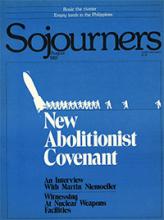Nancy Lukens: Many people who are aware of the holocaust in Europe during World War II are increasingly concerned about developments which could mean nuclear holocaust in our generation. You have said that you see a similarity between the silence, apathy, and blindness of clergy and church-people in the Third Reich and that of Christians today in the face of the expanding arms race and the danger of nuclear war. Would you elaborate on this for us? In particular, could you help us understand the phenomenon of the church in Nazi Germany acquiescing to Hitler's foreign policies, which made a religion of German nationalism?
Martin Niemoeller: When the Lutheran church was formed at the time of the Reformation, the Lutherans placed themselves under the protection of the secular ruler and designated him as their highest lay member, and at the same time, as their bishop. In my own generation, few people realized that the king of Prussia was in fact also the supreme authority, the bishop, of our Protestant church in Prussia.
Lukens: So your generation accepted this "throne and altar" connection?
Niemoeller: We lived with that connection--until some of us saw that it had to lead to conflicts between what secular authority--the state--demanded and what the church teaches about what God asks of us. Then we began to make a separation between "throne" and "altar," in concept and in practice--one that still holds today.
Read the Full Article

